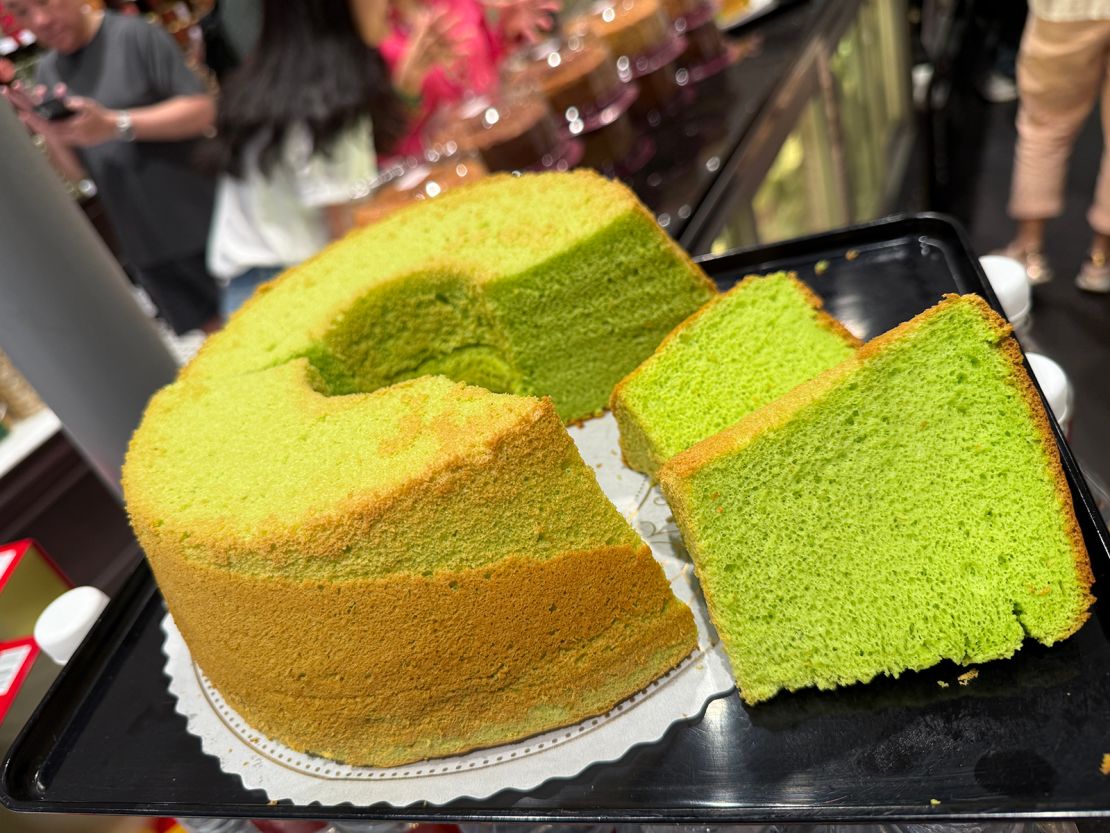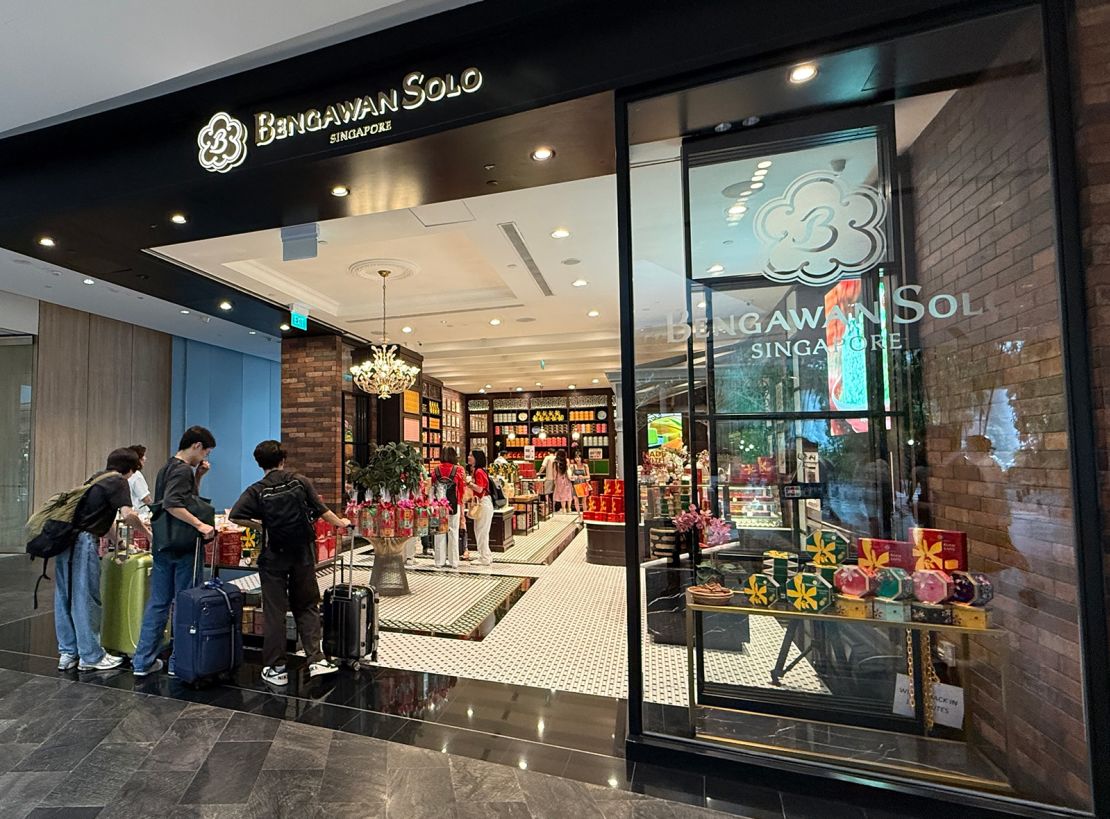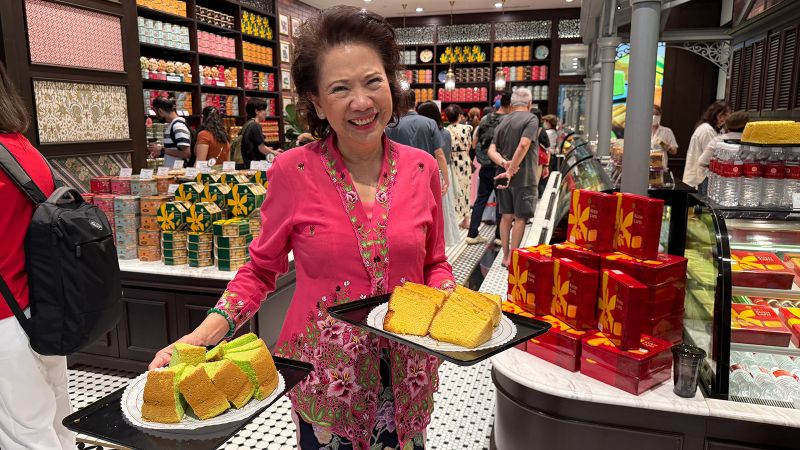CNN
—
A fluorescent green cake has become a daily staple in Singapore. Locals grab a slice of the ring-shaped pandan chiffon cake on their way to work or pick up an entire one for friends’ birthday celebrations.
The light, fluffy cake gets its color and subtle grassy vanilla taste from the tropical pandan plant, which is believed to have originated in Indonesia’s Moluccas Islands, and has been used in cooking for hundreds of years.
In Singapore, pandan chiffon cakes started appearing in the 1970s, says local food historian Khir Johari. Today, the dessert is ubiquitous in the city, appearing everywhere from mom-and-pop bakeries to upscale restaurants.
One particular family-owned bakery helped take the cakes citywide, Johari adds.
“I made it popular in Singapore,” says Anastasia Liew, who in 1979 founded the first Bengawan Solo cake shop, a small neighborhood store. “Sorry, we’re not very modest,” chimes in her son Henry, a company director, with a chuckle.

Anastasia initially sold cakes she baked at home but had to open a shop to meet the licensing requirements to sell to department stores. Today, Bengawan Solo has more than 40 shops across the city of six million people.
Henry says the bakery’s popularity comes down to word of mouth, with a little help from celebrity fans. For example, eight years ago Singaporean Mandopop star JJ Lin gifted a Bengawan Solo cake to fellow judges on a Chinese singing show. In 2022, Taiwanese music superstar Jay Chou posted on Instagram about being gifted the cakes when he performed in Singapore.
The company sells other products like kueh lapis, a layer cake, ondeh ondeh, glutinous rice balls filled with palm sugar, and pineapple tarts, pastries filled with fruity jam. But pandan chiffon cake is its best-known product.
Last year, the bakery sold about 85,000 whole pandan chiffon cakes, which cost 22 Singapore dollars ($17) – achieving sales revenue of about 76 million Singapore dollars ($57 million) across its products, up 11% from 2023. But its biggest opportunities may lie overseas.
“I don’t think we can grow very much more in Singapore,” says Henry. He adds that the company plans to focus on selling its products as food gifts across Asia, and hopefully further afield, by working on things like unique packaging. “In the Asian region, there’s a very strong gift giving culture,” he says.
It’s impossible to leave Singapore’s Changi airport without passing a Bengawan Solo. There are five stores at Changi, the world’s fourth-busiest international airport in 2024, including one in each departure terminal.
The cakes have become wildly popular in places like Hong Kong, where the friends, family, and colleagues of travelers from Singapore often expect a cake. Demand has even sparked a secondary market on Facebook Marketplace and the app Carousell.
Henry says that airport stores now account for more than half of Bengawan’s total sales, and its products seem to be the most popular with travelers from Hong Kong, mainland China, Taiwan, South Korea, and Japan.
The company has considered expanding overseas, he says, but it has come up against barriers like high rental costs in Hong Kong. The family also wants to ensure its quality is maintained. Today, it uses mostly local sources for its ingredients and gets the 300 to 400 kilograms of pandan leaves from just across the border in Malaysia.

With or without Bengawan Solo, the global appetite for pandan appears to be growing. In Hong Kong, Pandan Man is selling the cakes in two upscale shopping malls. Pandan cakes, and pandan-infused dishes, from mochi egg tarts to cronuts, have started popping up across cities like New York, San Francisco and Los Angeles.
Keri Matwick, a senior lecturer at Nanyang Technological University in Singapore, who researches food and language, says that there’s been a rise of interest in Asian baking in the US, including desserts flavored by ingredients like matcha, coconut and ube — a purple yam from the Philippines.
Matcha, a Japanese green tea that has been incorporated into everything from tiramisu to cupcakes to banana pudding, has become so popular that some tea sellers in Japan are warning of an impending shortage.
Now, it might be pandan’s turn to go global. “Matcha has already set that precedent of something green is okay,” says Matwick. “I think (pandan is) starting to emerge as more of a star than it ever has before.”



